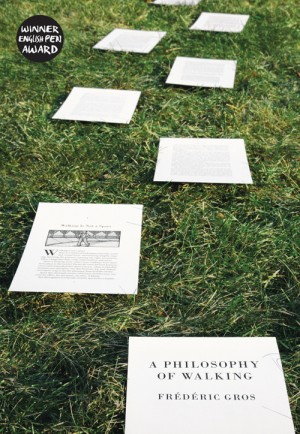You have no items in your cart. Want to get some nice things?
Go shopping A bestseller in France since its publication in 2009, Frédéric Gros’ A Philosophy of Walking has recently been released as an English translation by Verso, billed as an “insightful manifesto” on walking. The book charts Gros’ reflections on walking, but also considers walking as a practice in the lives of great thinkers such as Nietzsche, Rousseau, Thoreau and Rimbaud. Following on the coat tails of the recent renaissance in walking as a critical and literary subject, it steps into the growing “genre” of literary walking, represented by the writings of Rebecca Solnit, Merlin Coverley, Robert Macfarlane, W.G. Sebald, which have been very well received by readers over the past few decades.
A bestseller in France since its publication in 2009, Frédéric Gros’ A Philosophy of Walking has recently been released as an English translation by Verso, billed as an “insightful manifesto” on walking. The book charts Gros’ reflections on walking, but also considers walking as a practice in the lives of great thinkers such as Nietzsche, Rousseau, Thoreau and Rimbaud. Following on the coat tails of the recent renaissance in walking as a critical and literary subject, it steps into the growing “genre” of literary walking, represented by the writings of Rebecca Solnit, Merlin Coverley, Robert Macfarlane, W.G. Sebald, which have been very well received by readers over the past few decades.
Publishers know the popularity of this type of writing, but the reasons behind this genre as a cultural phenomenon have been given very little serious consideration. It is perhaps to give credence to a critical examination of walking as a literary trope, and philosophic mode, that I turned to Gros’ book, hoping to find in it both the rambling poetics of W.G. Sebald, but also an analytical framework which would illuminate why discussing the act of walking is important. But, while titled “a philosophy”, I found the book more a dawdle than a march. Its prose limp and saccharine, often repetitive, and overall a waste of time. This might sound overly harsh, but the tautological style of this book often makes it exasperating to read. To give a good example, Gros writes,
The freedom in walking lies in not being anyone; for the walking body has no history, it is just an eddy in the stream of immemorial life. So we are a moving two-legged beast, just a pure force among big trees, just a cry…
Need I continue? This may be a harsh perspective, from my cynical British eyes. Possibly in French the book has that lackadaisical aimlessness, so loved in the Proustian form of French novel and in French cinema. Perhaps even, the book is merely the victim of a rough and badly considered translation? At one point, the translator Richard Howe, makes Epicitetus proclaim that the “ground is my couch”, in a truly banal Americanisation of the stoic philosopher. But, even if we consider this translation as accurate, the book is pallid to the extent of parody. It feels more a weak vehicle for biographical detail, than rich philosophical curiosity. The selection of writers which Gros has chosen to focus on is evidently French; with Rousseau, and Rimbaud, heavily dwelling on the French literary canon. But also Nietzsche and Kant equally part of that European male oeuvre. Even with his description of Thoreau, there is a distinctly European reading of this thinking and relationship to nature in Waldon.
The book draws on considerable documentary evidence for the walking practice of these historic figures. However, at times there is desperation in the way Gros picks up on every detail of how and when these writers walked. The weakness of this biographical detail is especially conspicuous with the focus on Kant, whom even Gros agrees only took a brief daily walk, moved very slowly and desperately hated to perspire. From all accounts Kant should not really be considered a serious walker but Gros places him alongside the wild and indomitable Nietzsche, who went mad with exhaustion from his walking, and Rimbaud, whose prolific walks and writings on walking, are of course legendary. Indeed, I found that despite the obvious differences of all these writers, reading the book and viewing these thinkers from this same perspective of walking, forced them into similitude, often merging into one globulous entity of “walker”, which was both repetitive and monotonous. In Gros’ hands there is a methodic attention to their lives, their backgrounds, and the accounts of their walks, without very much consideration of what this actually means to our understanding of their work or even to the importance of these walks.
What Gros’ book very much picks up on is the passive, reflective mode of walking. Walking as a non-competitive act, which puts one foot in front of the other. An act which both internalises one’s thoughts, but also, for the writer, breaks them from the introversion of the internal world, to observe the wider world and their small place within it. But so much of this has already been said before, often by the very writers he cites. Nietzsche proclaimed that we do not belong to those who have ideas only among books […] it is our habit to think outdoors – walking, leaping, climbing, dancing, preferably on lonely mountains or near the seas where even the trails become thoughtful”. Perhaps this book would have been better if he had just published a selection of quotations from these very writers on the spirit of walking which he is trying to mine?
No doubt, in the great liberation exalted by the beat generation of Ginsberg and Burroughs, in that debauch of energy that was meant to tear up our lives and blow sky-high the dens of the submissive, walking in the mountains was just one means amongst others: others that included the drugs, the booze and the orgies through which we hoped to attain innocence.
What I found particularly guiling, (with full transparency as woman and a feminist), was the lack of women even considered in this discussion. That is, disregarding his small paragraph on the “sweetie-pie”,”working-class good time girls” who strolled the Tuileries Gardens in Paris during the Belle Epoque. While Gros makes a surreptitious nod towards William Wordsworth, where are the women included in this, like his sister Dorothy, Virginia Woolf or even Doris Lessing? In this criticism is an implicit frustration with the lack of ingenuity and contemporaneity to this account of walking. Writers like Nietzsche, Rimbaud and Thoreau have been scrapped over endlessly. Others to, like John Clare, Charles Dickens and James Joyce too have had a lot of attention, but perhaps were not popular enough with his original French audience. But what about more recent entrants to this history like the traveller Patrick Leigh Fermour, or Guy Debord, even the “London” tradition of psychogeography with Stewart Home, Iain Sinclair and Will Self? What of Werner Herzog, who famous suggested to Bruce Chatwin that “walking is virtue, tourism deadly sin”. What about more recent adventurers and escapists, like Jon Krakauer’s account of Chris McCandless. What if one broadened the genre and also concentrated on walking in the practice of visual art, in the work of Richard Long for example, or further into film, with Agnes Varda’s wonderful Vagabond?
Perhaps then, the problem here is that to broaden out this “philosophical” perspective on walking, to include wider genres of contemporary examples, would make this book far too diffused and diffuse. It is only when looking back at these key, sparse accounts of walking as a philosophical practice, that any clear conclusions on “a philosophy” of walking can be drawn. But these are conclusions which don’t resonate with contemporary life. The problem with this book, as with the genre of walking as a whole, is the generality of walking. While used in literature as a sublime expression of escape, of simplicity, and as a response to Modernity; walking is also in itself something so mundane and everyday. Indeed, to a “general public”, these books are often (rightly) derided for effectively teaching a grandmother to suck eggs. They seek to elevate these activities which were often simple to something much more complex and intentional. While Gros rallies around the importance of walking as an escape for the writers from the narrowing internalisations of reading, one should perhaps question his motives in communicating this message through the medium of the book. You feel Nietzsche would not have sat down long enough to read it. Instead, Gros should perhaps have merely written: “Get up from you chair. Go. Do not read the next 216 pages. Go outside and experience your world by walking for yourself.” But that would perhaps leave him, and his publisher, unemployed.

About Bea Moyes
Bea is currently studying for an MRes at the London Consortium, Birkbeck. She is a writer and researcher involved in exploring the poetics and cultural history of urban spaces, with a particular passion for yarnbombing and temporary street installations. Until summer 2012 Bea was director and curator of short stories at the digital publisher Ether Books and has worked with a number of publishers as well as for literary publicists and magazines.




